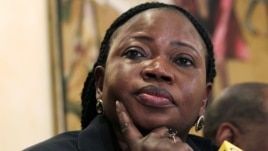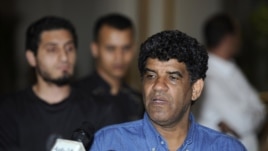UNITED NATIONS — The chief prosecutor of the International Criminal Court (ICC) has urged Libya’s new government not to grant an amnesty for serious crimes committed during last year’s revolution that toppled former dictator Moammar Gadhafi, no matter which side perpetrated them.
Fatou Bensouda, who took over as ICC chief prosecutor in June, made her first official briefing before the 15-nation U.N. Security Council on Wednesday. She said the court is in the process of deciding on an admissibility challenge made by the Libyan authorities requesting to try the former dictator’s son, Saif al-Islam Gadhafi, in Libya instead of handing him over to the court at The Hague.
Under the ICC’s charter, states have the first responsibility for investigating and prosecuting individuals, with the international court intervening only if a state is unable or unwilling to properly do so.
The prosecutor also expressed concern about a recent Libyan law that opens the door to a possible amnesty for “acts made necessary by the 17 February revolution,” saying there must not be impunity for anyone.
“I encourage the new Libyan government, scheduled to be sworn in in the coming days to ensure that there is no amnesty for international crimes and no impunity for crimes, regardless of who the perpetrator is and who is the victim,” Bensouda said.
Libya’s U.N. envoy, Ibrahim Dabbashi, told the council that Libya would not neglect any case “irrespective of the identity of the victim or the accused,” but would focus initial trials on leaders of the former regime.
“As we already underscored, the Libyan judicial authorities will concentrate initially -- they will concentrate their inquiries and trials on the perpetrators and leaders of the Gadhafi regime," he said. "They are the main perpetrators of serious crimes committed because they were the ones who commanded, orchestrated these crimes.”
The envoy said Libya is also planning to petition the international court to let them try former intelligence chief Abdullah al-Senussi, who was extradited from Mauritania in September and is wanted by the ICC.
Dabbashi said there are many leaders from the Gadhafi regime outside the country and the government is trying to persuade states that are harboring them to send them back to Libya to be tried.
Richard Dicker, head of the International Justice program at Human Rights Watch, told reporters that the U.N. Security Council must make good on its commitment to see serious crimes prosecuted by the ICC. He also noted that the court’s prosecutor has a mandate that allows her to investigate crimes committed by both sides in the Libyan uprising.
Fatou Bensouda, who took over as ICC chief prosecutor in June, made her first official briefing before the 15-nation U.N. Security Council on Wednesday. She said the court is in the process of deciding on an admissibility challenge made by the Libyan authorities requesting to try the former dictator’s son, Saif al-Islam Gadhafi, in Libya instead of handing him over to the court at The Hague.
Under the ICC’s charter, states have the first responsibility for investigating and prosecuting individuals, with the international court intervening only if a state is unable or unwilling to properly do so.
The prosecutor also expressed concern about a recent Libyan law that opens the door to a possible amnesty for “acts made necessary by the 17 February revolution,” saying there must not be impunity for anyone.
“I encourage the new Libyan government, scheduled to be sworn in in the coming days to ensure that there is no amnesty for international crimes and no impunity for crimes, regardless of who the perpetrator is and who is the victim,” Bensouda said.
Libya’s U.N. envoy, Ibrahim Dabbashi, told the council that Libya would not neglect any case “irrespective of the identity of the victim or the accused,” but would focus initial trials on leaders of the former regime.
“As we already underscored, the Libyan judicial authorities will concentrate initially -- they will concentrate their inquiries and trials on the perpetrators and leaders of the Gadhafi regime," he said. "They are the main perpetrators of serious crimes committed because they were the ones who commanded, orchestrated these crimes.”
The envoy said Libya is also planning to petition the international court to let them try former intelligence chief Abdullah al-Senussi, who was extradited from Mauritania in September and is wanted by the ICC.
Dabbashi said there are many leaders from the Gadhafi regime outside the country and the government is trying to persuade states that are harboring them to send them back to Libya to be tried.
Richard Dicker, head of the International Justice program at Human Rights Watch, told reporters that the U.N. Security Council must make good on its commitment to see serious crimes prosecuted by the ICC. He also noted that the court’s prosecutor has a mandate that allows her to investigate crimes committed by both sides in the Libyan uprising.


Nessun commento:
Posta un commento